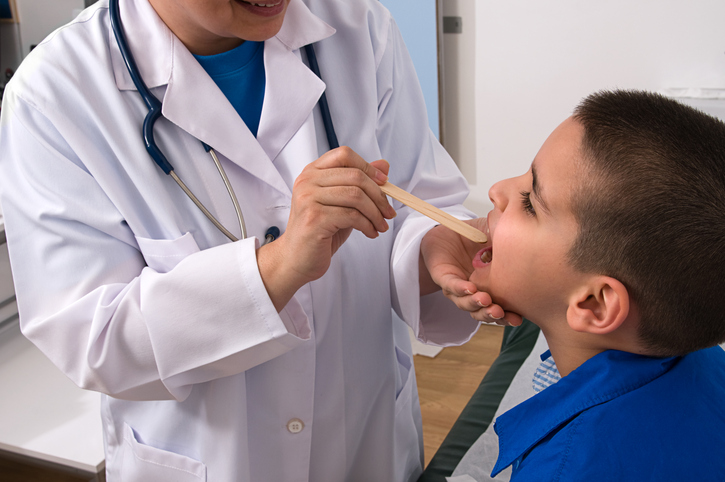When your child wakes up in the morning complaining of throat pain, your first impulse might be to blame it on the dry air pumping from your furnace to keep you warm and comfortable. If that sore throat lasts much past a good breakfast, a glass of water and an attentive toothbrushing, it’s time to take a closer look. Your child may have strep throat, which require antibiotics and quick action to prevent others from becoming infected.
Strep throat is caused by a wide variety of streptococcal bacteria. Your child could have been exposed virtually anywhere – daycare, school, church, stores, other homes – by breathing in infected droplets from a person who has sneezed, coughed or just breathed too closely to your child. Yes, just breathing closely can spread strep throat; it is that infectious. Symptoms usually appear within 2-5 days of exposure to the virus.
Along with the sudden soreness in your child’s throat, he will experience pain while swallowing, a fever, and a bright red throat, possibly with white or yellow spots in the back. His tonsils and lymph nodes in the neck will be swollen. He may complain of a headache or a stomachache.
Call our office immediately to schedule an urgent appointment. Your child will need a rapid strep test as soon as possible. If that test is positive, we’ll know he has strep throat. If that test is negative, we may take a throat culture, which is a little more uncomfortable, but will give us a definitive answer.
If he has tested positive for strep, we’ll start your child on a course of antibiotics immediately. Treating strep medically is extremely important. Without treatment, strep can develop into middle ear infections and sinus infections. More seriously, untreated strep can cause rheumatic fever, tonsil abscesses, kidney damage and pediatric autoimmune neuropsychiatric disorders (PANDAS). Strep needs to be treated with antibiotics quickly.
Your child will still be contagious for 24 hours after he begins the antibiotics, so keep him out of daycare, home from school and other activities, and isolated from family members. Replace his toothbrush so he is not re-infected. Do not let him share cups, plates, utensils, towels or other linens. Encourage ample use of disposable tissue when he coughs or sneezes, and throw it away immediately. Your Alzein Pediatrics medical professional may also recommend an over-the-counter pain reliever and fever reducer to ease your child’s discomfort.
Preventing strep from infecting your family in the first place can be a challenge. Wash hands with soap and water or alcohol-based gel often, use alcohol wipes on carts and baskets in stores, and stay out of contact with known infected persons.
Though uncommon, if your child has recurring strep even though he is treated with antibiotics, or if he develops abscesses on his tonsils, it may be time to discuss a tonsillectomy.
Sore throats can be caused by dry air, runny noses or allergies. Gargling with salt water can moisten tissues while reducing inflammation. However, whenever you suspect strep throat, it’s time to call Alzein Pediatrics immediately to avoid potentially serious complications.
Have a question about strep, tonsils or sore throats? Give us a call at 708-424-7600 and we’ll be happy to answer your questions. Click “Book An Appointment” on the left for an urgent care appointment. We’re with you and your family – from cradle to college!



